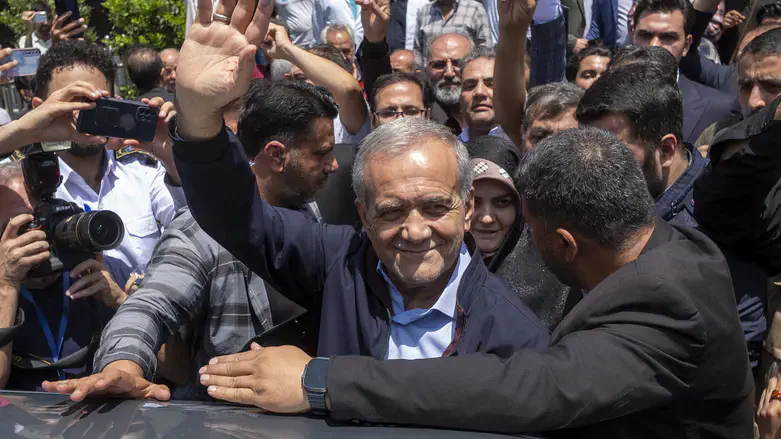
Iranian election headed to runoff
Reformist Masoud Pezeshkian and former nuclear negotiator Saeed Jalili to face off in second round after no candidate wins more than 50% of the votes in round one.

Iran’s former nuclear negotiator and a reformist candidate will face each other in a runoff presidential election, after results from Friday’s election, released Saturday, showed the lowest-ever poll turnout in the Islamic Republic’s history, The Associated Press reported.
More than 60% of voters cast no ballot in the race that saw reformist Masoud Pezeshkian best former nuclear negotiator Saeed Jalili, who competed alongside two other hard-liners.
Of the 24.5 million votes cast in Friday’s election, Pezeshkian got 10.4 million while Jalili received 9.4 million, election spokesman Mohsen Eslami announced on Saturday, according to AP. Parliament speaker Mohammad Bagher Qalibaf got 3.3 million, while Shiite cleric Mostafa Pourmohammadi had over 206,000 votes.
Iranian law requires that a winner gets more than 50% of all votes cast. If not, the race’s top two candidates advance to a runoff a week later. There’s been only one other runoff presidential election in Iran’s history. That occurred in 2005, when Mahmoud Ahmadinejad bested former President Akbar Hashemi Rafsanjani.
The elections in Iran are to replace Ebrahim Raisi, who was killed in a helicopter crash last month.
More than 1 million votes were voided, according to the results, typically a sign of people feeling obligated to cast a ballot but not wanting to select any of the candidates.
The overall turnout was 39.9%, according to the results. The 2021 presidential election that elected Raisi saw a 48.8% turnout, while the March parliamentary election saw a 40.6% turnout.
Jalili previously ran for President in 2013. At the time, he pledged to “resist” western demands regarding his country’s nuclear program if he is elected.
Pezeshkian on Friday expressed hope that Iran would have good relations with all countries - except for Israel.
He made the comments to journalists after voting. Responding to a question from a journalist about how Iran would manage international relations if he were president, Pezeshkian replied, “God willing, we will try to have friendly relations with all countries except Israel.”
Pezeshkian’s anti-Israel comments are not surprising, as both moderates and hardliners have long been critical of Israel.
The country’s most recent “moderate” President was Hassan Rouhani, who was first elected in 2013 and reelected four years later.
Shortly after being elected in 2013, Rouhani called Israel an "old wound" that "should be removed". Iranian media later claimed that Rouhani’s remarks were distorted.
In 2018, Rouhani said that Israel “can never feel safe” because it is “oppressing the Palestinian nation.
He later called Israel a "cancerous tumor" and urged Muslim nations worldwide to unite and destroy Israel.
